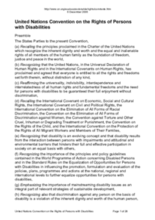The Convention on the Rights of Persons with Disabilities is a human rights treaty establishing rights of persons with disabilities. It was adopted by the UN General Assembly on 13 December 2006 and it came into force on 3 May 2008. It has been ratified by 157 countries to date. A number of provisions of the Convention are especially relevant to children's care. A number of articles are directly applicable to the care of children with disabilities as well as support for caregivers who have disabilities, in particular Article 7 on children with disabilities, Article 19 on Living independently and being included in the community, Article 14 on Liberty and security of the person, Article 16 on Freedom from exploitation, violence and abuse, and Article 23 on Respect for home and the family , among others.
In particular, Article 23 on Respect for home and the family, stipulates that:
-
States who are party to the Convention must ensure that children with disabilities have equal rights with respect to family life and that early and comprehensive information, services and support to children with disabilities and their families should be established to prevent concealment, abandonment, neglect and segregation of children with disabilities.
-
In no case should a child be separated from parents on the basis of a disability of either the child or one or both of the parents.
-
Where the immediate family is unable to care for a child with disabilities, States Parties must undertake every effort to provide alternative care within the wider family, and failing that, within the community in a family setting.
-
States Parties must also render appropriate assistance to persons with disabilities in the performance of their child-rearing responsibilities.
Access other language versions here.
Read also:
Optional Protocol to the Convention on the Rights of Persons with Disabilities

